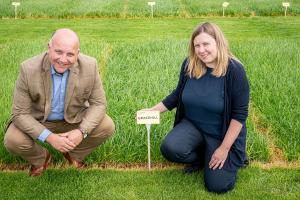Nineteen ryegrass varieties bred by AFBI have been included on the recently released 2020/2021 Recommended Grass and Clover Lists (RGCL), with Ballyvoy and Gracehill being new additions from AFBI.

To be recommended, grass varieties undergo rigorous testing across a number of testing sites across the UK, once again confirming the huge success of the grass breeding research programme at AFBI Loughgall, which is supported by funding from the Department of Agriculture, Environment and Rural Affairs (DAERA).
AFBI’s two newest varieties include the late heading diploid variety Ballyvoy, and Gracehill which is a late heading tetraploid variety. All of AFBI’s grass varieties, including these two new ones are marketed through AFBI’s commercial partner Barenbrug UK Ltd.
Ballyvoy, which heads on 2 June, topped its category for both yield and quality under silage management, with no other late diploid variety on the list producing more metabolizable energy yield per hectare (105% of the mean of all late diploid varieties on the list). Ballyvoy also showed a very good balance of grazing yield across the season, topping the list for both early and autumn grazing yield.
Gracehill heads on the 1st June and has proven to be an excellent all-round performer across the season, producing high annual yields of good quality grass under both grazing and silage management, and extremely high metabolizable energy yields per hectare (108% and 104% of the mean of all late tetraploid varieties on the list under grazing and silage management, respectively).
The first seed of Gracehill and Ballyvoy is expected to be commercially available in small quantities from the 2020 and 2021 UK harvest, respectively, through AFBI’s commercial partner, Barenbrug UK Ltd.
The excellent results from the RGCL also reconfirm the status of AFBI as one of the top breeders of intermediate perennial ryegrasses in the UK. Galgorm, which first entered the list in 2018, has maintained its position at the top of the intermediate diploid category for total yield under both grazing and silage management, with no other intermediate diploid variety on the list producing more metabolizable energy yield per hectare under grazing management (106% of the mean of all intermediate diploid varieties on the list).
Fintona has also maintained its position as one of the highest yielding intermediate heading tetraploid varieties, producing high total yields of 101% and 107% under grazing and silage management, respectively, compared with the mean of all intermediate tetraploid varieties on the list.
Both Galgorm and Fintona have been important additions to the extensive range of AFBI-bred varieties available for use on-farm in N. Ireland, having been specifically bred for best performance under local environmental conditions.
The AFBI grass breeding programme
The 19 varieties included on the 2020/2021 RGCL hail from a long line of top-performing varieties produced by the highly successful DAERA-supported AFBI grass breeding programme at Loughgall. Advances in grass breeding research mean that new varieties coming onto the market show improvements in traits such as yield, nutritional quality and disease resistance, compared with varieties currently available, which is an important factor in reducing the carbon footprint of the agricultural sector while increasing productivity.
The addition of Ballyvoy and Gracehill to the 2020/2021 RGCL increases the number of AFBI-bred varieties now recommended for use to 19. These include the early maturing varieties Moyola and Glasker, the intermediate diploid varieties Galgorm, Moira, Glenariff and Gosford, the intermediate tetraploid varieties Fintona, Seagoe, Dunluce and Caledon, the late diploid varieties Callan, Dundrod, Drumbo, Glenarm and Clanrye, the late tetraploid variety Ballintoy and the hybrid variety Bannfoot. Each of these varieties have been proven to show increased performance, and have been bred for use in particular situations as part of high-performing cutting and grazing mixtures.
Grass is the most important crop on farms in Northern Ireland and one of the most efficient ways of improving productivity from grass is to breed varieties which are well adapted to local farming conditions. The ongoing research and development work undertaken by the AFBI grass breeding programme ensures that a steady supply of new varieties like Ballyvoy and Gracehill are produced that can meet the ever changing demands of the grassland and livestock industries in N. Ireland.
View the Recommended Grass and Clover List
Notes to editors:
AFBI is an arms-length body of DAERA delivering research and development, diagnostic and analytical testing, emergency response capability and expert scientific advice for DAERA and other government departments, public bodies and commercial companies in Northern Ireland, and further afield.
AFBI’s Vision is “Advancing the Local and Global Agri-Food Sectors Through Scientific Excellence”
AFBI’s core areas:
- Leading improvements in the agri-food industry;
- Protecting animal, plant and human health;
- Enhancing the natural and marine environment.
Latest news
- AFBI issues Nematodirus warning – Spring 2025 11 April 2025
- Managing Nature Based Risks to the UK Economy and Opportunities for Green Finance 08 April 2025
- AFBI Hillsborough host AERA committee 27 March 2025
- The Omics Days Conference 27 March 2025
